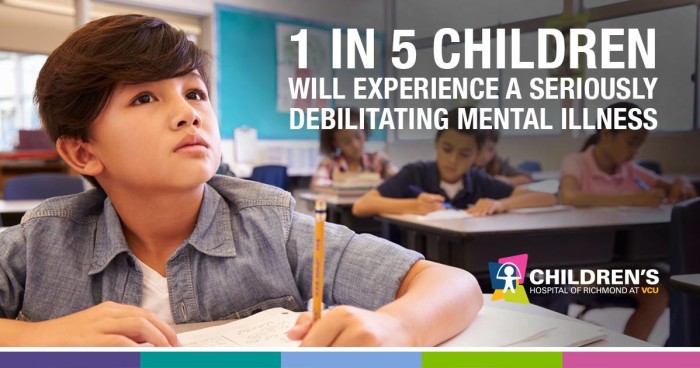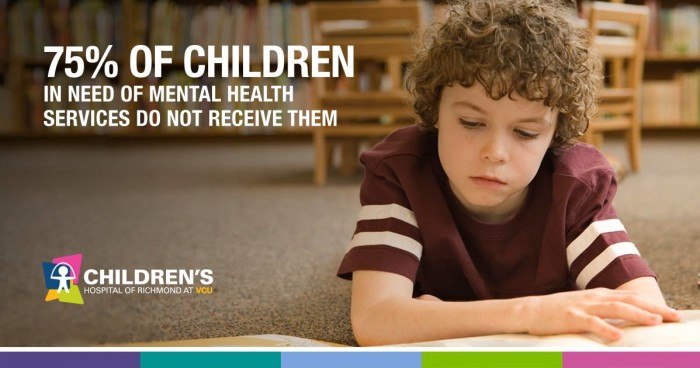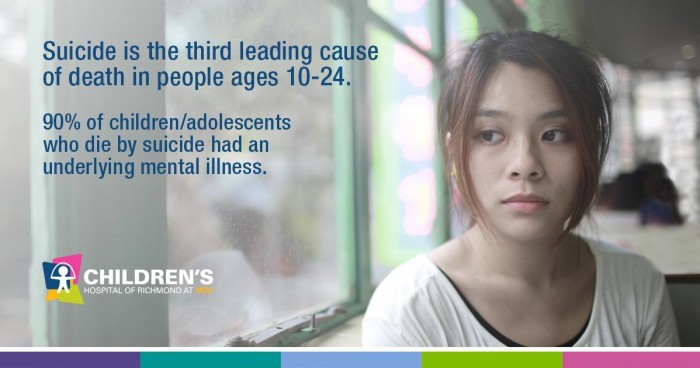Children's Emergency Department is now located in Children's Tower: 1001 E. Marshall Street.
Learn more
NPR Ed’s recent series exploring mental health in schools found that in a classroom of 25 students, five of them may be struggling with depression, anxiety or substance abuse, and yet nearly 80 percent of children who need mental health services won’t get them. According to the first article in the series, experts say that schools could play a role in identifying students with problems and helping them succeed, but it’s a role many schools aren’t prepared for.

In the Q&A that follows, Dr. Aradhana “Bela” Sood, a child and adolescent psychiatrist at CHoR’s Virginia Treatment Center for Children, shares specifics on what teachers and other school professionals need to be aware of to be more prepared to help and why their role in helping children who need mental health services get the support they need is particularly important. Parents should also be aware of the warnings signs Dr. Sood describes, where to go for help, and how mental health issues may be addressed in a school setting. A comprehensive approach involving a child’s family and those who work with the child on a daily basis can help ensure that no child in need falls through the cracks.

Children spend two-thirds of their waking hours in school where they are observed by professionals who have a very good sense of development and what is normal behavior. Next to parents, educators (i.e., teachers and other school professionals who work with children on a daily basis) are the closest adult figures in a child’s life and can usually gauge when a child is in trouble. A school’s response to off-track behavior usually takes the form of disciplining the child or teen based on school policies. However, no situation is one-size-fits-all and these interventions may not help resolve the issue because they are not getting at the root cause of the problem. As an example, aggressive actions may be arising from deeper issues than misbehavior or oppositional tendencies. The student may be depressed, displaying this behavior in response to negative events in their environment such as bullying within the school or community, unsafe housing or exposure to violence themselves or experiencing underlying problems with ADHD or a learning disability (it’s better being labelled a “trouble maker” than “slow”).
Although the role of teacher/school professional may be primarily focused on educating the child, an awareness of mental health issues can assist in picking up on the types of problems that may require more attention than simply suspensions, expulsions, or special education referrals. When teachers and other school professionals can refer a child to an appropriate interventionist – such as a child mental health provider – it can lead to a more positive outcome that will likely include improved behavior, better learning, and academic and social success.
Behavior that is clearly discordant with acceptable norms and is consistently getting a child into trouble is a major warning sign. If the behavior is new, can it be explained by recent stressful events in the child’s life (divorce, a recent move, etc.) or not? Either way these behavior issues may need further investigating and even simply asking the child how their day was or what’s going on helps open the door to more supportive and enlightening conversations.
Teachers may also note a marked departure from previous behaviors with grades dropping, poor grooming and hygiene, moving into a peer set with shared negative values, along with loss of focus and motivation.
Signs of substance abuse such as changes in behavior with physical signs of drug abuse (dilated or pinpoint pupils, red eyes, etc.) and generally unfocused behavior are also causes for concern, as are more obvious signs of distress which include actually making statements that suggest distress (i.e., posting threatening or odd statements on social media or violating social media etiquette with no remorse or almost with bravado).
Every school’s guidance office should serve the role of primary support for educators to receive input about behavior and the guidance office should develop a mechanism for preliminary assessment of a child/teen involving contact with parents and, if deemed necessary, a referral to a health/mental health provider, preferably through a child’s pediatrician.
If a child is having problems, then working with the school guidance clinic and involving the child’s parents would be a good first step to get the child help.
Asking simple yet direct questions of a child who may be looking sad or seem preoccupied or unmotivated may uncover the underlying problems and with general knowledge of child mental health issues and how to access support, teachers can help a child/family connect with the right person for help.
In the long run, any serious efforts to create an environment of wellness within schools will require an assessment of the school climate. Providing teachers with the tools to be supportive of and communicative with students, reducing or ideally prohibiting bullying, and having an inclusive culture that is tolerant of differences will improve the overall mental wellness of students.

School nurses can be a resource for the guidance office by being aware of the mental health issues that can masquerade as physical health issues. Anxiety, for example, can lead to frequent trips to the school clinic with a child complaining of a stomach or a headache. In these types of cases, support of the student and the parent is essential, however, recurrent episodes of clinic visits, with no specific physical reason per the pediatrician, should suggest that the student be encouraged to remain in school and not return home. With parental permission, a short phone call to the pediatrician may be helpful to develop a team approach and/or bring concerns to the child’s guidance counselor.
Continuing education that includes mental health topics (because they are so common) is a very important investment for school nurses as well as teachers and other school personnel.
A child’s pediatrician is the primary contact for moderate to chronic mental health problems. For an emergency mental health crisis, the community service board for a school’s geographic area is the recommended contact. (The Richmond Behavioral Health Authority, for example, is the resource for Richmond school.) A community services board is the point of entry into Virginia’s publicly-funded system of services for mental health, intellectual disability and substance abuse. CSBs provide pre-admission screening services 24-hours per day, 7 days per week. An educator can provide parents with the name of these resources but parents are the only ones that make a decision regarding their children’s health. Educators can also utilize these resources to ask for education and training around mental health issues.
CHoR’s Virginia Treatment Center for Children provides evaluations and assessments of mental health issues and ongoing treatment for therapy along with holistic management of mental health issues. VTCC also serves as a training and education resource and a resource with providers who can serve as consultants within school systems and partner with educators around these issues.

Behavioral health resources
Virginia Treatment Center for Children: (804) 828-3129
Virginia Community Service Boards
Richmond Behavioral Health Authority: (804) 819-4100
ChildSavers: (804) 644-9590
Children’s Mental Health Resource Center: (804) 447-2124
National Suicide Hotline: 1-800-273-TALK
VCU Suicide Hotline: 1-800-784-2433
Trevor Project for LGBTQ youth: 1-866-488-7386
Crisis One − Urgent community crisis intervention and mobile outreach
Teachers, child care workers, clinicians and parents are invited to join us for the 54th Annual Children’s Mental Health Symposium on October 7.